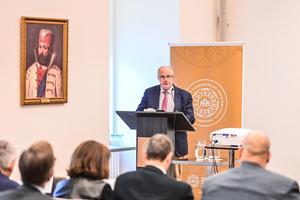“Although Roman law played a key role in shaping the legal and political thinking of the Western world, today it seems to have lost its recognition in higher education. Meanwhile, the rediscovery of the classical roots of the American constitutional system and the re-creation of the relationship between American law and European legal traditions are also taking place today” - Adrian Vermeule, professor of constitutional law at Harvard University, spoke about this at the international conference organized by the University of Public Service under the title Common Good. Through the renowned foreign and domestic speakers of the professional forum, interested parties were able to get an idea of how Roman law helps to find answers to the most pressing legal and social challenges of our time.
Roman law played a decisive role in shaping the legal and political thinking of the Western world. It is still a compulsory subject for future lawyers, but nowadays it seems to have lost its value and recognition in higher education - for example in Germany, where it was considered fundamental for centuries. Meanwhile, somewhat surprisingly, it is increasingly gaining prominence overseas or in China. What is behind this and what is the role of Roman law in the 21st century? How can you respond to current legal and social challenges? The international conference entitled Common Good (“Közjó”) was organized on November 30 by the Ludovika Collegium of the University of Public Service (UPS) to discuss these issues.
Gergely Deli, Rector of UPS, said in his welcome speech: “this event is special not only because of the numerous experts from distant countries, but also because it is relatively rare that a conference deals not only with the given topic - in this case, Roman law - , but the participants can also exchange ideas about the future of their profession - and this forum creates an opportunity for this as well. We have a great responsibility to pass on our knowledge and ideas to the next generation” - pointed out the rector. After that, Gábor Hamza, professor emeritus of the ELTE Faculty of State and Law (ÁJTK), led the presentations of the speakers of the first panel.
In his opening lecture, Adrian Vermeule, professor of constitutional law at Harvard University, expressed his view that Roman law will be more important in the 21st century than in the previous two centuries. In his presentation entitled The American Lex Regia, he considered the parallels between the American political and constitutional system and Roman law. He indicated: “although the analogy is imperfect, since the institutions of Roman law are of course different from the institutional system of the USA, the comparison can shed light on some peculiarities of the constitutional system”. He pointed out that even today the classical roots of the American constitutional system are being rediscovered, and the relationship between American law and European legal tradition is being recreated. As an illustration of this connection, he referred to the increasingly wide range of powers delegated by the legislature to the executive power, which he paralleled with the legal institution of the lex regia. Regarding the transformation of the role of this branch of power, Professor Vermeule believed that it should not be seen as an alternative or competitor to governance by the people, but rather as a means of exercising it, which, among other things, means protection against the influence of oligarchic forces that undermine the principle of popular sovereignty.
At the beginning of his presentation entitled “Reflections on the tasks of Romanists of our time”, András Földi, professor emeritus of the ELTE ÁJTK, quoted in Latin from Virgil's epic Aeneid the thoughts according to which the Romans did not measure up to the achievements of Greek culture in many respects - be it science or art - , but with their legal system they created something permanent. In connection with this, the professor drew attention to a problem related to the education of Roman law and related institutions. It would be important for today's specialists dealing with Roman law to carry out more effective research than before regarding the education of Roman law institutions. Many researchers think that there is nothing new to discover in the field of Roman private law, since it has not changed in the past millennium and a half. But according to his experience, there are many important problems that deserve the attention of researchers of our time. In contrast to the 1970s and 1980s, Roman law is no longer taught based on primary sources, on the basis of Gaius' Institutions or the works created as a result of the Justinian codification, but as he put it: "we use modern textbooks, in which, however, you can find many serious contradictions the students. These could be remedied by analysing the sources, namely through the first codified collection of Roman law known as the Corpus Iuris Civilis," the professor pointed out. After that, he illustrated with concrete examples the topics that one of his talented students had raised over the years, and for which the textbooks discussing Roman law do not provide relevant answers. There is also good news - he indicated, referring to the recent Hungarian and serious German publications on the subject, which have also become available to the Hungarian professional audience.
Aldo Petrucci, a professor at the University of Pisa, shared his experience with the teaching of Roman law with the audience. He spoke in detail about the relevant changes of the 2005 educational reforms and the subjects that play a role in the education of Roman law. It was said that a significant part of their training is the teaching of this knowledge as a compulsory subject. In this regard, he mentioned two challenges. One is how to design the content of the subjects, and the other is the creation of a textbook that effectively helps the processing of this complex topic in the 21st century. Summarizing the details of the professor's experiences, he stated that lawyers have three tasks in relation to this area of law: encouraging scientific dialogue, passing on knowledge, and maintaining interest so that the next generations will be happy to deal with this knowledge.
Philip J. Thomas, a professor at the University of Pretoria, noted above all in his presentation: although he is happy to see young people in the audience of this conference, unfortunately, Roman law is becoming more and more marginalized these days. The question is, what could be behind this and what can be done about it? The key word, he indicated, in this case is relevance. The relevance of Roman law has already been proven over the past millennia. Throughout history, these teachings have been used by many people, from the church to state leaders to businessmen. "But this is a treasure trove, some elements of which have not yet been discovered," he added. In his lecture, the professor gave a detailed overview of the role of Roman law in legislation and the development of jurisprudence. He also talked about the thinkers of the Frankfurt School, who contributed to the ideological basis of the student revolts of 1968, and the peculiarities of the South African higher education system. Regarding the latter, he highlighted at the end of his presentation: the teaching of Roman law plays a key role in the development of students' critical thinking.
The conference continued along this line of thought: in the second panel, the participants could listen to lectures on the methodology of teaching Roman law, and then the presentations of the third block touched on topics such as the possibilities of algorithmizing law or the role of artificial intelligence in the world of law.
Text: Lilla Kovács
Photo: DénesSzilágyi
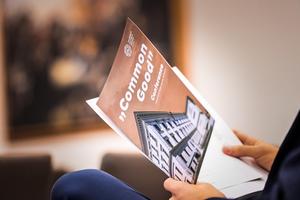
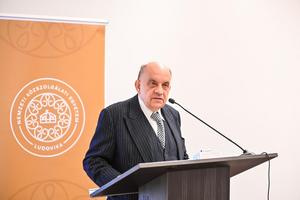
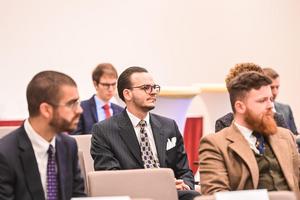
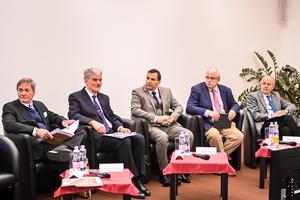
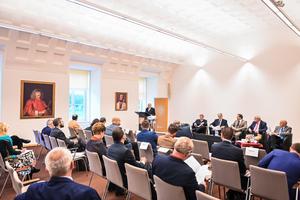
.jpg)
